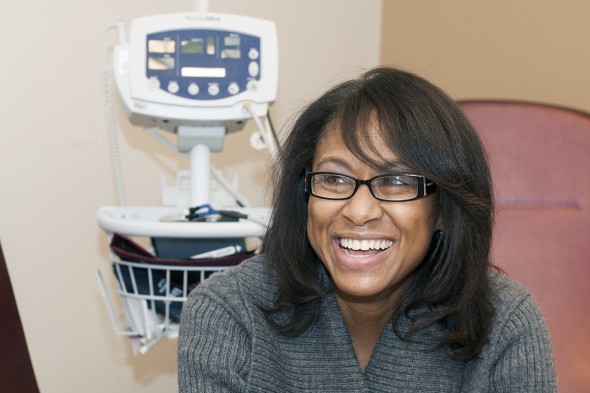New approach leads to ‘only hope’ for successful kidney transplant

Kimberly Gosell, executive director of development in the College of Medicine, received an orphan drug that led to a successful kidney transplant with her father as donor. “I am humbled and grateful,” she says. Photo: Robert Dupuis-Devlin/UIC Photo Services
Kimberly Gosell had more than 40 friends and family willing to donate a kidney to restore her health — and an immune system primed with harmful antibodies that would damage a new organ from any of them.
Gosell, executive director of development in the College of Medicine and the mother of two teens, had developed high levels of antibodies that attack foreign tissue, which made finding a compatible donor nearly impossible.
In 2008, Gosell’s cousin donated a kidney for the first transplant. The procedure was unsuccessful, and Gosell spent the last two-and-a-half years on dialysis in declining health that required her to go on medical leave in November 2012.
About eight weeks ago, UI Health physicians tried a new approach.
To combat the destructive antibodies and render them harmless so she could receive a new kidney, Gosell received an orphan drug that had been shown — in small studies — to inhibit antibody-mediated rejection.
“This was her only hope for a transplant,” said Enrico Benedetti, professor and head of surgery.
In some cases, an organ transplant can be performed even if the donor and recipient are not compatible. The patient must undergo several days of therapeutic plasma exchanges, or plasmapheresis, to remove antibodies from the blood. The patient is then given an infusion of immune globulin to mask the harmful antibodies, along with a drug to suppress the immune system.
When antibodies against the donor’s white blood cells decrease to very low levels and the crossmatch becomes negative, the patient is ready for transplant.
In Gosell’s case, attempts to achieve a negative crossmatch with plasmapheresis were unsuccessful.
The orphan drug she received, Eculizumab, is a monoclonal antibody that can block activation of the body’s complement system, a group of proteins in the blood that are ultimately responsible for the damage to the transplanted organ.
In previous studies, kidney transplant patients with a positive crossmatch were treated with plasmapheresis to remove antibodies from the blood until a negative crossmatch was achieved. Then Eculizumab was used to reduce the rate of antibody-mediated rejection.
Gosell received an injection of Eculizumab a few hours before receiving one of her father’s kidneys Feb. 13.
“I am humbled and grateful for my dad,” she said.
She continued to get periodic injections of the drug for up to several weeks after the transplant.
The drug “may allow successful kidney transplantation even in patients who are usually excluded from transplant,” said Benedetti, who believes this is the first time the drug has been used in a patient with a persistently highly positive crossmatch. The transplant team that performed the procedure included Jose Oberholzer, chief of transplantation surgery.
“We would not have dared to do the transplant in our center without the protection of the drug,” Benedetti said.
Gosell named her new kidney “Faith.”
In one of her recent Facebook posts she writes, “Notes from Kidneyland — Faith and I are coexisting in a beautiful fashion. She is quite the lifesaver!”
